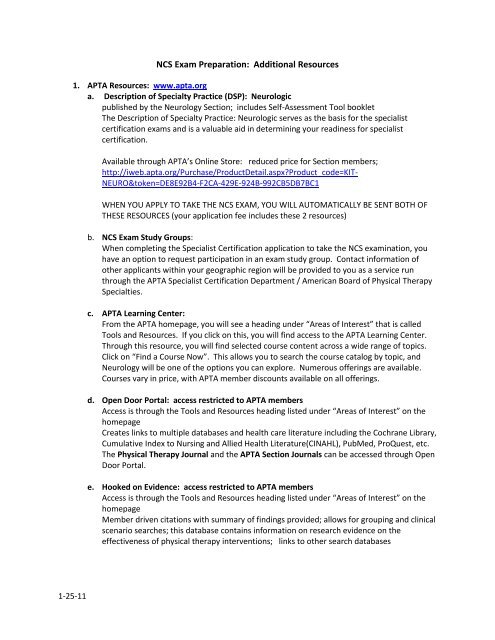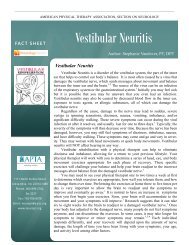NCS Exam Preparation: Additional Resources - Neurology Section
NCS Exam Preparation: Additional Resources - Neurology Section
NCS Exam Preparation: Additional Resources - Neurology Section
You also want an ePaper? Increase the reach of your titles
YUMPU automatically turns print PDFs into web optimized ePapers that Google loves.
<strong>NCS</strong> <strong>Exam</strong> <strong>Preparation</strong>: <strong>Additional</strong> <strong>Resources</strong>1. APTA <strong>Resources</strong>: www.apta.orga. Description of Specialty Practice (DSP): Neurologicpublished by the <strong>Neurology</strong> <strong>Section</strong>; includes Self-Assessment Tool bookletThe Description of Specialty Practice: Neurologic serves as the basis for the specialistcertification exams and is a valuable aid in determining your readiness for specialistcertification.Available through APTA’s Online Store: reduced price for <strong>Section</strong> members;http://iweb.apta.org/Purchase/ProductDetail.aspx?Product_code=KIT-NEURO&token=DE8E92B4-F2CA-429E-924B-992CB5DB7BC1WHEN YOU APPLY TO TAKE THE <strong>NCS</strong> EXAM, YOU WILL AUTOMATICALLY BE SENT BOTH OFTHESE RESOURCES (your application fee includes these 2 resources)b. <strong>NCS</strong> <strong>Exam</strong> Study Groups:When completing the Specialist Certification application to take the <strong>NCS</strong> examination, youhave an option to request participation in an exam study group. Contact information ofother applicants within your geographic region will be provided to you as a service runthrough the APTA Specialist Certification Department / American Board of Physical TherapySpecialties.c. APTA Learning Center:From the APTA homepage, you will see a heading under “Areas of Interest” that is calledTools and <strong>Resources</strong>. If you click on this, you will find access to the APTA Learning Center.Through this resource, you will find selected course content across a wide range of topics.Click on “Find a Course Now”. This allows you to search the course catalog by topic, and<strong>Neurology</strong> will be one of the options you can explore. Numerous offerings are available.Courses vary in price, with APTA member discounts available on all offerings.d. Open Door Portal: access restricted to APTA membersAccess is through the Tools and <strong>Resources</strong> heading listed under “Areas of Interest” on thehomepageCreates links to multiple databases and health care literature including the Cochrane Library,Cumulative Index to Nursing and Allied Health Literature(CINAHL), PubMed, ProQuest, etc.The Physical Therapy Journal and the APTA <strong>Section</strong> Journals can be accessed through OpenDoor Portal.e. Hooked on Evidence: access restricted to APTA membersAccess is through the Tools and <strong>Resources</strong> heading listed under “Areas of Interest” on thehomepageMember driven citations with summary of findings provided; allows for grouping and clinicalscenario searches; this database contains information on research evidence on theeffectiveness of physical therapy interventions; links to other search databases1-25-11
2. <strong>Neurology</strong> <strong>Section</strong> <strong>Resources</strong>: http://www.neuropt.org/a. <strong>NCS</strong> Resource List: this is a list of resources exam takers have found useful in studying forthe <strong>NCS</strong> exam. The list provides electronic links to the references whenever possible. Tofind this list on the <strong>Neurology</strong> <strong>Section</strong> website, go to the tab labeled “HealthcareProfessionals” and then click on “Neurologic Specialist Certification”, which comes up alongthe left-hand menu.b. Special Interest Groups:The <strong>Neurology</strong> <strong>Section</strong> is comprised of Special Interest Groups in the areas ofo Balance and Fallso Brain Injuryo Degenerative Diseaseso Spinal Cord Injuryo Strokeo Vestibular RehabilitationInformation related to the Special Interest Groups may be accessed off the <strong>Neurology</strong><strong>Section</strong> homepage—click on “Special Interest Groups”.By visiting the webpages for each of these Special Interest Groups, you will be able to accessa wide variety of literature, patient videos, fact sheets, etc. that are specific to that healthcondition.1-25-113. Outside resources: a few examplesa. Baylor College of Medicine—Department of <strong>Neurology</strong>: Case of the monthhttp://www.bcm.edu/neurology/case.htmlAlthough this website is designed as an interactive site for Baylor’s medical residents, itoffers the physical therapist a wide variety of neurologic case examples to explore. Many ofthese cases involve patients with more complicated or unusual diagnoses/ clinicalpresentations. Patient history and exam data are provided. The clinical summary of thepatient’s examination findings gives insight into how the medical diagnosis was reached andthe differential diagnoses that might have been considered. Post-test questions allow thereader to consider the take-away messages considered to be most important in each case.b. Neurological Cases: The University of Utahhttp://library.med.utah.edu/neurologicexam/cases/home_cases.htmlPatient examination videos augment patient history and findings in four separate patientcases.c. Neurologic <strong>Exam</strong> Videos and Descriptions: An Anatomical Approach (University of Utah)http://library.med.utah.edu/neurologicexam/html/home_exam.htmlWebsite offers anatomical information and videos in the areas of mental statusexamination, cranial nerve exams, coordination, sensory, motor, and gait examinations.Pediatric neurologic examination videos and descriptions are also available through thesame website.
















